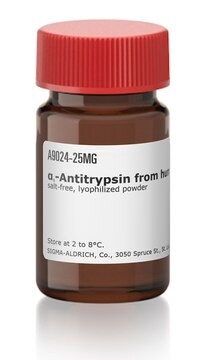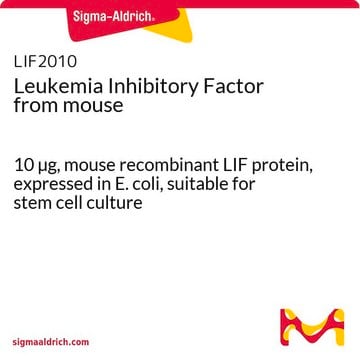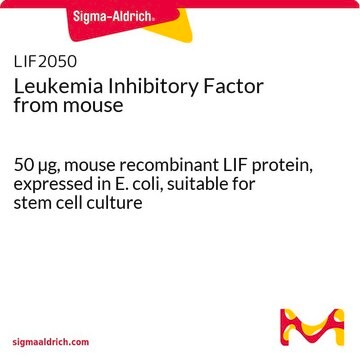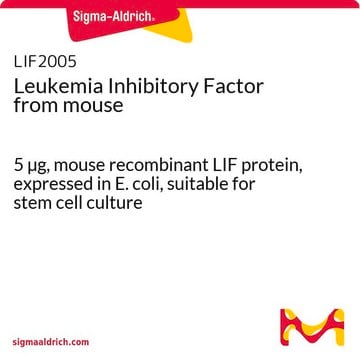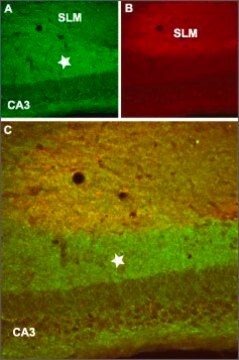LIF20
Leukemia Inhibitory Factor from mouse
Sinónimos:
D Factor, Differentiation-stimulating Factor, LIF
About This Item
Productos recomendados
origen biológico
mouse
Nivel de calidad
Ensayo
>95% (SDS-PAGE)
fabricante / nombre comercial
Chemicon®
técnicas
cell culture | stem cell: suitable
impurezas
<0.1 ng/mg endotoxin (of LIF)
entrada
sample type mesenchymal stem cell(s)
sample type neural stem cell(s)
sample type induced pluripotent stem cell(s)
sample type: mouse embryonic stem cell(s)
sample type hematopoietic stem cell(s)
Nº de acceso NCBI
Nº de acceso UniProt
Descripción general
Aplicación
M1 Bioassay
1. The M1 bioassay is performed using in vitro semi-solid agar cultures, which contain approximately 100 cells in 1 mL volumes of DME containing 20 % FCS in 0.3% agar.
2. Add 100 μL of sample or mLIF (10(E4) units/mL in 5% FCS in isotonic saline) in two-fold serial dilutions in duplicate to 35 mm petri dishes.
3. Add 100 μL of 5% FCS in isotonic saline to two control slides.
4. Incubate at 37°C in fully humidified atmosphere of 10% CO2 in air for 7 days.
5. Score the number of colonies that show differentiation (note: 50 units is defined as the amount of activity which results in 50% of the colonies being differentiated).
Visit www.esgro-lif.com for additional information
Manufactured by CHEMICON International, Inc. LIF is protected under US Patent nos. 5,443,825, 5,750,654 and 6,261,548, European Patent no. 0285 448 and related foreign patents and is not available for resale.
Definición de unidad
Forma física
Almacenamiento y estabilidad
Manufactured by CHEMICON International, Inc. LIF is protected under US Patent
Nota de análisis
Información legal
Cláusula de descargo de responsabilidad
Código de clase de almacenamiento
12 - Non Combustible Liquids
Clase de riesgo para el agua (WGK)
WGK 2
Punto de inflamabilidad (°F)
Not applicable
Punto de inflamabilidad (°C)
Not applicable
Certificados de análisis (COA)
Busque Certificados de análisis (COA) introduciendo el número de lote del producto. Los números de lote se encuentran en la etiqueta del producto después de las palabras «Lot» o «Batch»
¿Ya tiene este producto?
Encuentre la documentación para los productos que ha comprado recientemente en la Biblioteca de documentos.
Nuestro equipo de científicos tiene experiencia en todas las áreas de investigación: Ciencias de la vida, Ciencia de los materiales, Síntesis química, Cromatografía, Analítica y muchas otras.
Póngase en contacto con el Servicio técnico